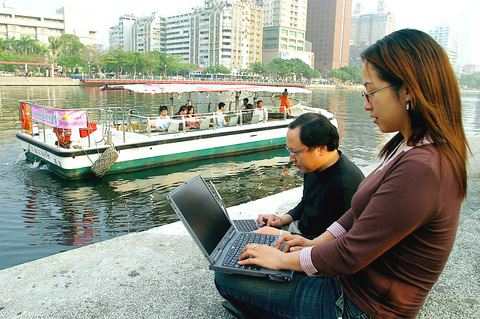Claiming to be the nation's first "real" mobile city, Kaohsiung City yesterday inaugurated wireless Internet connections in parts of the city to provide free access in the public.
"I believe the wireless infrastructure will bring more benefits to our people and visitors," Kao-hsiung Mayor Frank Hsieh (

PHOTO: CHANG CHUNG-YI, TAIPEI TIMES
Hsieh tested the system while riding a boat on Kaohsiung's landmark Love River, and he said "the result is excellent ... the connection speed is faster than the broadband system I use at home."
The wireless service is currently available in or near the city government building, the City Council, the Cultural Center and Hsinkuang Wharf, said Tony Wu (吳國棟), chief operation officer of Easpnet Taiwan Inc (數位通國際網路). Easpnet became the contractor for the project after winning the bid in October.
By the end of next April, the service will be extended to downtown Lingya, Shinshing and Chienchin Districts. Kaohsiung's other eight districts will receive the service by the end of next year, giving the city 80 percent coverage, Wu said.
The mobile city project will cost the Kaohsiung City Government an estimated NT$93 million, Wu said. The service will be free for one year after the entire project is completed, or from the end of next year, he said.
The system will also be used to improve security. The wireless connection is linked to monitoring systems set in crossroads, a digital fire alert system, and a vehicle tracking system, which allows the police force and fire department to obtain information instantly.
The Taipei City government also has a similar plan to bring wireless connection to the whole city by the end of next year.
The government is currently testing the system in the area around the Taipei City Government building in Hsinyi District. By the end of this year, the service will be officially launched along 20 Mass Rapid Transportation stations.
The wireless infrastructure, however, has reportedly been less well received than expected by Taipei residents due to compatibility problems.
The Taipei City Government contracted different companies to build the wireless system in different areas. State-run Chunghwa Telecom Co (中華電信) covers the general Hsinyi District, Qware Systems Inc (安源資訊) is in charge of MRT stations, while restaurants and coffee shops have their own wireless service providers, forcing users to apply for another user account when they enter another area.
One official at Easpnet who did not want to be named said this problem will not occur with Kaohsiung's wireless network. However, he acknowledged that access there is still not completely stable due to signal interference in the area.
The company will streamline this later to make the system run more smoothly, he said.

SEMICONDUCTORS: The German laser and plasma generator company will expand its local services as its specialized offerings support Taiwan’s semiconductor industries Trumpf SE + Co KG, a global leader in supplying laser technology and plasma generators used in chip production, is expanding its investments in Taiwan in an effort to deeply integrate into the global semiconductor supply chain in the pursuit of growth. The company, headquartered in Ditzingen, Germany, has invested significantly in a newly inaugurated regional technical center for plasma generators in Taoyuan, its latest expansion in Taiwan after being engaged in various industries for more than 25 years. The center, the first of its kind Trumpf built outside Germany, aims to serve customers from Taiwan, Japan, Southeast Asia and South Korea,

Gasoline and diesel prices at domestic fuel stations are to fall NT$0.2 per liter this week, down for a second consecutive week, CPC Corp, Taiwan (台灣中油) and Formosa Petrochemical Corp (台塑石化) announced yesterday. Effective today, gasoline prices at CPC and Formosa stations are to drop to NT$26.4, NT$27.9 and NT$29.9 per liter for 92, 95 and 98-octane unleaded gasoline respectively, the companies said in separate statements. The price of premium diesel is to fall to NT$24.8 per liter at CPC stations and NT$24.6 at Formosa pumps, they said. The price adjustments came even as international crude oil prices rose last week, as traders

Taiwan Semiconductor Manufacturing Co (TSMC, 台積電), which supplies advanced chips to Nvidia Corp and Apple Inc, yesterday reported NT$1.046 trillion (US$33.1 billion) in revenue for last quarter, driven by constantly strong demand for artificial intelligence (AI) chips, falling in the upper end of its forecast. Based on TSMC’s financial guidance, revenue would expand about 22 percent sequentially to the range from US$32.2 billion to US$33.4 billion during the final quarter of 2024, it told investors in October last year. Last year in total, revenue jumped 31.61 percent to NT$3.81 trillion, compared with NT$2.89 trillion generated in the year before, according to

PRECEDENTED TIMES: In news that surely does not shock, AI and tech exports drove a banner for exports last year as Taiwan’s economic growth experienced a flood tide Taiwan’s exports delivered a blockbuster finish to last year with last month’s shipments rising at the second-highest pace on record as demand for artificial intelligence (AI) hardware and advanced computing remained strong, the Ministry of Finance said yesterday. Exports surged 43.4 percent from a year earlier to US$62.48 billion last month, extending growth to 26 consecutive months. Imports climbed 14.9 percent to US$43.04 billion, the second-highest monthly level historically, resulting in a trade surplus of US$19.43 billion — more than double that of the year before. Department of Statistics Director-General Beatrice Tsai (蔡美娜) described the performance as “surprisingly outstanding,” forecasting export growth